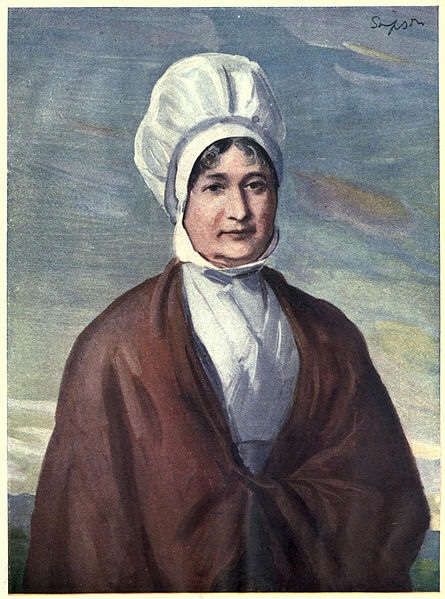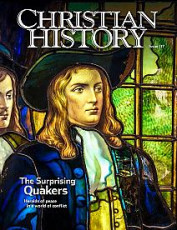Quaker Prophets FORETOLD a Noble Work for Elizabeth Gurney

[Portrait of Elizabeth Fry by Joseph Simpson; public domain, A Gallery of Heroes and Heroines, 1915 / Wikimedia]
WE REMEMBER Elizabeth Gurney Fry primarily as a nineteenth-century prison reformer. She was much more: a wife, a mother, a Quaker preacher, founder of homeless shelters, benefactress of lonely coast guard watchers, founder of a nursing school, collector of prison data, agitator for a law to abolish death penalty offenses, and the first woman to testify before a select committee of Parliament.
Little in her childhood seemed to foretell her eventual acclaim. Fry (the married name by which she is best known) was a timid, often-sickly child and, by her own account, afraid to confront people with truth. The Gurneys were English Quakers, but she found Quaker meetings a bore. During her teens she enjoyed music, dancing, flirting, novel-reading, high society, and other indulgences. At the same time, her journal shows she had qualms about these activities and tried to develop a more religious attitude.
Her direction changed when she was seventeen. On this day, 4 February 1798, she attended a meeting at which an American Quaker spoke. William Savery’s messages tended to stir revival among Quakers.
Richenda, one of Fry’s siblings, remembered the seven sisters sitting in a row in the Quakers’ Norwich meeting house, Elizabeth in bright unquakerlike shoes.
At last William Savery began to preach. His voice and manner were arresting, and we all liked the sound; [Elizabeth’s] attention became fixed: at last I saw her begin to weep, and she became a good deal agitated.... [Later] we went home as usual, and, for a wonder, we wished to go again in the afternoon....[In] our return home in the carriage. Betsy sat in the middle, and astonished us all by the great feeling she showed. She wept most of the way home. The next morning, William Savery came to breakfast, prophesying of the high and important calling she would be led into.
Fry’s own journal recorded the impression Savery made upon her mind:
Sunday, February 4th, 1798.... I wish the state of enthusiasm I am in may last, for to-day I have felt that there is a God; I have been devotional, and my mind has been led away from the follies that it is mostly wrapt up in. We had much serious conversation; in short, what he said and what I felt, was like a refreshing shower falling upon earth, that had been dried up for ages.... I have felt ever since humble. I have longed for virtue. I hope to be truly virtuous; to let sophistry fly from my mind; not to be enthusiastic [i.e. fanatical] and foolish; but only to be so far religious as will lead to virtue.
Her growth in grace was not instantaneous. A week later she journaled that her old irreligious feelings with regard to meetings had returned. However, she did continue to grow spiritually and even gave up singing that she might concentrate wholly on godly work, such as feeding the hungry, teaching young children (those were the days before public schools), and tending the sick.
Savery was not alone in prophesying an illustrious future for Fry. That fall, Deborah Darby, an elderly Quaker woman in Colebrook Dale, felt prompted by the Spirit to tell Gurney she would become a light to the blind, speech to the dumb, and feet to the lame. “She seems as if she thought I was to be a minister of Christ,” mused Fry. “Can I ever be one? If I am obedient, I believe I shall.”
In time, both prophecies were fulfilled. Elizabeth and Stephen Fry married in 1800. Between bearing eleven children, most of whom survived to adulthood, Fry continued good works. However, after she became engaged in assisting women prisoners and their children, she had to place her own younger children in the care of her sisters.
Horrified by conditions in Newgate Prison, where hundreds of starving, quarreling, drunken, half-naked women were crowded into a few small, filthy rooms with their children, Fry undertook to get them clothes, to provide their children with an education, to teach the women to govern themselves, to give them useful work, and to ameliorate their condition when they were transported to prison colonies. And she offered hope from Scripture for those who were to be hanged.
The transformation in the women was astonishing. Her work load became even greater as reformers from all over Europe wrote or visited her for advice on reforming their own prisons. She toured prisons in Ireland, Scotland, and France. She spoke with heads of state and with the future Queen Victoria.
—Dan Graves
- - - - - - -
For more on the Quakers, watch Quakers: That of God in Everyone at RedeemTV
(also available at Vision Video)
and read CH117 The Surprising Quakers
Other Events on this Day
- Bakht Singh: from Lying Playboy to India's Leading Church-Planter
- MASEMOLA BAPTIZED IN HER OWN BLOOD FOR REJECTING IDOLS








